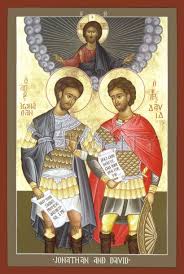HOMILY WEEK 02 04 – Year II
Friendship in the Lord and Healing in His Name:
(1 Sam 18:6 – 19:7; Ps 56; Mk 3:7-12)
************************************************
“True friends are like diamonds, precious and rare; False friends are like Autumn leaves, found everywhere.”
That saying, seen on a poster at a treatment centre, touches on the first reading today calling us to true friendship in the Lord.
The friendship between Jonathan and David is a model of what true friendship is – two persons who have each other’s best interest at heart. Loyalty and commitment to the relationship also mark a true friend.

David & Jonathan
Jonathan, who was the king’s son, valued his friendship with David more than his own place as next in line to the throne, and was ready to lay his life on the line to defend and protect David. If David prefigured Jesus as a true king, their friendship modelled for us what friendship in the Lord was like.
One quality of a true friend Jonathan displayed was that of a mediator working towards reconciliation. With great courage, caring and diplomacy, Jonathan was able to reason with his father to re-consider his malicious plans for David, communicate with both sides, and bring about a resolution to the painful situation, at least temporarily. That is a role that we can all seek to play in our dealing with family, friends and even communities.
Judith Vorst, in her book Necessary Losses, states that “close friends contribute to our personal growth. They also contribute to our personal pleasure, making the music sound sweeter, the wine taste richer, the laughter ring louder because they are there. Friends furthermore take care – they come if we call them at two in the morning; they lend us their car, their bed, their money, their ear; and although no contracts are written, it is clear that intimate friendships involve important rights and obligations. Indeed, we will frequently turn – for reassurance, for comfort, for come-and-save-me help – not to our blood relations but to friends.”
I learned a profound lesson in friendship one day as a young Oblate missionary in the north. A brother Oblate in the next mission and I were involved in Worldwide Marriage Encounter as team priests and through dialogue, became close and intimate friends as well as colleagues in ministry. Early one New Year’s Day, there was a triple murder in his community. Three parishioners to whom he had become close were killed by a drunken jealous man. I went up to the funeral bringing some people with me and thus had to leave right after the funeral. Only months later did he share with me how devastated, let down and disappointed he was that I did not plan to stay with him to support him at a time when he desperately needed a friend. That was when I learned that a true friend will try to place himself or herself in the other’s shoes, to sense what he or she might need, and set aside personal plans to try to meet that need.
What is so wonderful about our faith is that Jesus considers us friends (John 15:15) and is himself our best friend, always wanting a more intimate, covenant relationship with us. In the gospel today, we see him giving himself selflessly to others, healing them indiscriminately – a principal mark of the Lord’s ministry. There was a deep biblical conviction that when the day of the Lord arrives, creation would be set right. What we witness in the healings of Jesus is just this repairing of creation. Even the demons whom he casts out identify him as Son of God. Mark also points out people came from all directions in great numbers, a sign that Jesus was also the Messiah whose role was to gather all nations to himself. This is our best friend!
We also know that Jesus had a two-fold mission: to redeem and to sanctify; to forgive and to heal. Saul, in the first reading, is a case study of humanity in need of both. He certainly needed forgiveness for his attempts to kill David, but even more so, needed healing of his insecurity and jealousy that led him to plan such evil deeds. Saul needed forgiveness for his sin, and healing for his sinfulness, that which made him sin. As such, he symbolizes most of humanity and our need for Jesus as redeemer, Son of God, Messiah, and true friend.
The Eucharist is an experience of Jesus in all those ways. We worship him as Son of God, and we receive his forgiveness and experience his healing as the Messiah. We also listen to his Word as his friends, and experience his love through intimate communion with him.
May our celebration bring us forgiveness and healing, deepen our friendship with him, send us out to befriend the world as he did, and especially to experience true friendship in the Lord.



